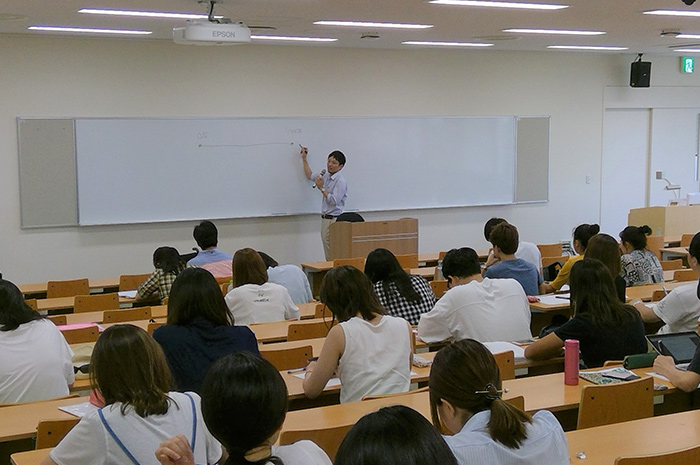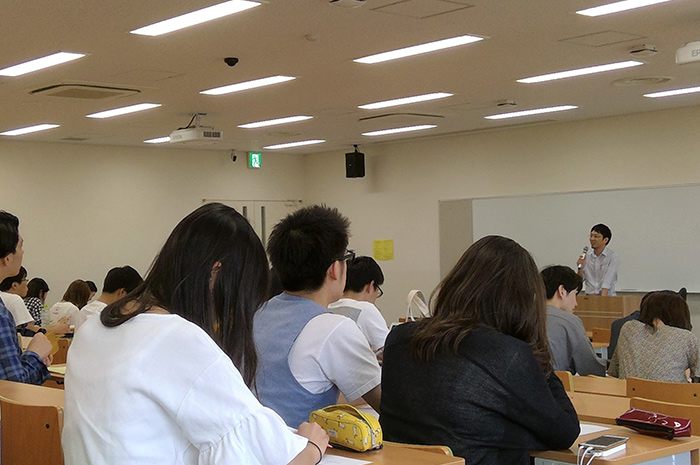Class Introduction:International Political Economy (Political Science Approach 1)
What kind of subjects do FGS students usually take, and what do they learn?
This time, we introduce the course “International Political Economy (Political Science Approach) 1” by Professor Kazutoshi Suzuki.

Comment from Professor:
International Relations is said to be an interdisciplinary field of study. This means it is a subject that crosses multiple disciplines. This is because international relations are complex and multifaceted phenomena that need to be viewed from various perspectives. International political economy is a sub-field of international relations, and it has precisely these characteristics. The external economic policies of a nation are implemented with the aim of economic prosperity, but they are also greatly influenced by diplomatic and security considerations.
Therefore, at FGS, in addition to lectures that analyze international economy from an economic perspective (economic approach), we also offer lectures that analyze from a
political perspective. This course focuses on such political aspects of the international economy. We will introduce perspectives that analyze the political causes and impacts of economic relationships between countries (e.g., trade and investment liberalization and globalization).
Currently, the international system that governs the world economy is in a period of flux. Multilateral liberalization negotiations under the WTO have stalled, and regionalism, such as FTAs, has increased. Recently, we see developments like Brexit, the U.S. withdrawal from TPP, the conclusion of Japan-EU EPA, and TPP11. Students will experience these changes and their future effects throughout their lives. The aim of this lecture is to deepen understanding with an eye on the application of convincing historical contexts and theoretical frameworks that explain them. We hope this will provide a “measuring tool” useful for observing future events.

Class Interview
Although it has a review element by touching upon the theories learned in the compulsory course of “Introduction to International Relations Theory” in the first year, a deeper understanding is sought as “International Political Economy”, thus it addresses complex theories interwoven with examples. In this course, we learn the necessary theories and case studies to gain a deep understanding of economic issues (trade issues,
investment liberalization) in the international community from a political perspective. If you take it alongside the “International Political Economy (Economic Approach)” course which is offered simultaneously, I think you can understand International Political Economy in a systematic and multifaceted way. If you want to consider the issues in International Political Economy from a political science perspective, learn about politics while also touching economics, or if you're unsure whether to take a political or economic approach seminar in International Political Economy, I highly recommend this course. (Kaita Ikeya, Third-year, Faculty of Global Studies)
When I decided to major in the field of International Politics and was considering which courses to take, I learned about this course which started this semester. Originally, I was not interested in political economy as I’m not good at economics, but I became intrigued by the phrase “political approach” and decided to take the course. When I actually took the course, I found that many of the terms mentioned during the lectures were things I learned in my first year, and as the name suggests, it is a course that studies politics and economics from a political science perspective. The outline is not just a fill-in-the-blank format but shows the lecture content in a “flow”, so even if there is something you do not understand during the lecture, you can learn in conjunction with the outline. Additionally, Professor Suzuki includes his own personal anecdotes in his explanations, making each lecture fascinating. What impressed me the most about the course was when all the students practiced the “Prisoner's Dilemma” in class. Instead of just learning by inputting information, I found that experiencing it myself deepened my understanding further. In this way, this course has been designed with lots of ideas so that students like me, who may feel uneasy about political economy, can understand it with confidence. After taking this course for about three months, I realized that the foundation of all events between nations is politics, and I became interested in the fields of politics and economics. (Shotaro Ohba, Second-year, Faculty of Global Studies)
